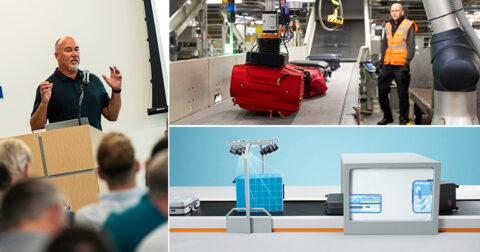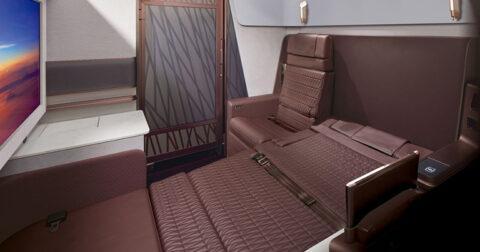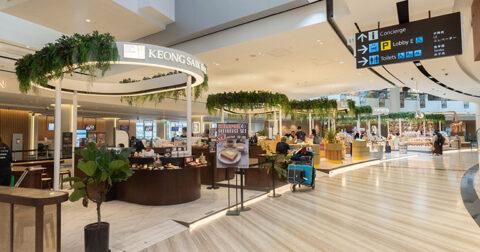The beginning of a new year brings with it an opportunity, coinciding with this week’s CES 2024, to take a look at the trends, as well as the new and emerging technologies, which will shape the air transport industry over the next 12 months and beyond. This year, our list features 12 trends that will play a crucial role in improving passenger experiences and enhancing business performance. We explore everything from robotics, automation and Artificial Intelligence to biometrics and digital identity, sustainability and Urban Air Mobility.
Robotics and automation
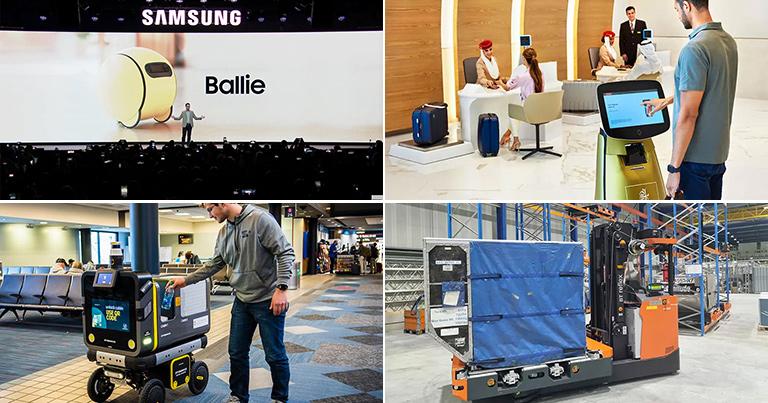
A continuing and overriding trend this year and beyond will be increasing implementation of robotics and automation, using technology to streamline operations and offset rising labour costs. There has been a big acceleration of robotics and automation on the ramp and there is now quite an advancement in personal assistant robots, as evidenced by their prevalence at CES 2024. We were particularly impressed by Samsung’s Ballie personal assistant robot, which is equipped with an onboard projector and enhanced Artificial Intelligence (AI) capabilities. FTE has been talking to a number of industry stakeholders and robotics companies and we see some developments in this space, and potential for personal assistant robots to be used for a VIP touch in lounges and to greet passengers at check-in, for example. Emirates is already utilising Sara is an innovative portable robotic check-in system, who can match faces with scanned passports, check-in passengers, and guide them to the bag drop area, at its City Check‑in and Travel Store.
Autonomous technology is also being used to future-proof operations. Schiphol Group, for example, has plans to achieve a fully autonomous airside operation by 2050, while Avinor’s EU-funded autonomous baggage transport project has a big focus on robotics. As part of this, it has formed an innovation partnership with Vanderlande to explore ways of fully automating the last mile of the baggage handling process. Avinor and Vanderlande are both members of FTE’s Baggage Innovation Working Group, for which automation is a key focus area in 2024.
FTE firmly believes that the best innovation is always collaborative innovation, and during the inaugural Aviation & Robotics Summit last year, Pittsburgh International Airport (PIT) and International Airlines Group (IAG) launched an innovation partnership that will explore exciting new solutions with the robotics and tech community. This will see IAG – one of the world’s largest airline groups with brands including Aer Lingus and Iberia in addition to British Airways – leverage PIT’s xBridge Innovation Center, building on a shared vision to drive the aviation industry forward by developing technological solutions to safety, customer experience and operational efficiency challenges for both airlines and airports.
Meanwhile, autonomous robots are increasingly prevalent at airports for the delivery of retail and food & beverage. ADR Ventures, the new Corporate Venture Capital arm of Aeroporti di Roma (ADR) – a Corporate Partner of the FTE Digital, Innovation & Startup Hub – last year made its initial venture investment with Ottonomy, a deep tech startup providing contactless deliveries using fully autonomous robots. In North America, Cincinnati/Northern Kentucky International Airport and PIT, through its xBridge Innovation Center, are also among those having implemented autonomous robots.
The vast potential of this trend was explored in detail in the FTE Robotics & Autonomous Vehicles Symposium at FTE Global 2023, with insights from the likes of PIT, IAG, Royal Schiphol Group, and nlmtd. Robotics and automation will undoubtedly remain a key area to watch in 2024.

Artificial Intelligence and Machine Learning

Artificial Intelligence (AI) was undoubtedly the hottest topic at CES 2024, with AI seemingly integrated into almost every new technology solution. So, we definitely see AI and Machine Learning (ML) as a key trend once again. AI is a core theme of the FTE Digital, Innovation & Startup Hub in 2024, and the FTE AI Symposium at FTE Global 2023 explored the potential of AI in aviation 5, 10, and 20 years from now, with some fascinating insights that can be viewed in this video.
We’re approaching an era of pervasive AI, in which these technologies transform our everyday lives in potentially unpredictable ways, including in commercial aviation. These transformations will impact the passenger experience, as well as airline and airport operations.
We are particularly impressed by the capabilities of Generative AI and Large Language Model (LLM) platforms such as ChatGPT, which experienced a spectacular rise in 2023. While it remains early days in terms of identifying use cases beyond chatbots and virtual assistants, we are excited about the possible applications in aviation and how it might be utilised. As we reported in this article last year, Seattle-Tacoma International Airport sees a lot of potential for its use in the aviation space – its exploratory efforts including using ChatGPT to create the framework for an Aviation Technology Master Plan. Generative AI also has the potential to enhance CX with more personalisation and IBM recently highlighted several potential use cases, including creating digital twins, planning and optimising airports, and supporting predictive maintenance. In its recent ‘Meet the Megatrends’ report, SITA highlighted that: “With the arrival of Generative AI in 2023, the technology has surged to the top of airport and airline agendas, with 97% of airlines planning a program to develop the technology.”
Meanwhile, in its ‘2023 IT Insights’ SITA indicates that 86% of airlines are collaborating with innovation partners to make advancements in AI, ML, and computer vision. “39% of these have already been implemented, while another 47% confirmed plans by the end of 2026. Looking at airports, 16% of airports already use AI and ML for improved decision-making, with another 51% confirming plans to implement such solutions by the end of 2026.”
Among the myriad examples of the implementation of AI, Etihad Airways recently became one of the first airlines to use the technology to enhance safety management systems; airBaltic is using AI to drive business efficiency; Shanghai Hongqiao International Airport is enhancing the passenger experience and operational efficiency with AI and ML powered solutions; Amsterdam Airport Schiphol and Pangiam are commencing the next-stage trials of Project DARTMOUTH, using AI to enhance inspection of carry-on bags; and International Airlines Group has AI firmly at the top of its innovation agenda, which will we report on in more detail in the coming weeks.
Interested in the latest technologies and trends? Sign up to our newsletter >>Digital displays reinvented

Among the coolest tech on show at CES 2024 was the impressive advancements in digital displays. This use of space is clearly what the future will look like, whether it’s Las Vegas’ new Sphere or ‘The Wonderfall’ – a 14m-tall digital display at the heart of Changi’s refreshed T2 departure hall. There are clear operational benefits too, from guiding travellers through security to creating a more effective, exciting retail environment.
A new trend this year is transparent displays. LG has already made transparent OLED screens for business and its newest OLED T model is designed to blend seamlessly into the surrounding room when not in use. Samsung also unveiled its Transparent MICRO LED display at CES 2024, which is anticipated to have commercial applications in the near future and make “the line between content and reality virtually indistinguishable”.
Interested in the latest technologies and trends? Sign up to our newsletter >>Biometrics and digital identity
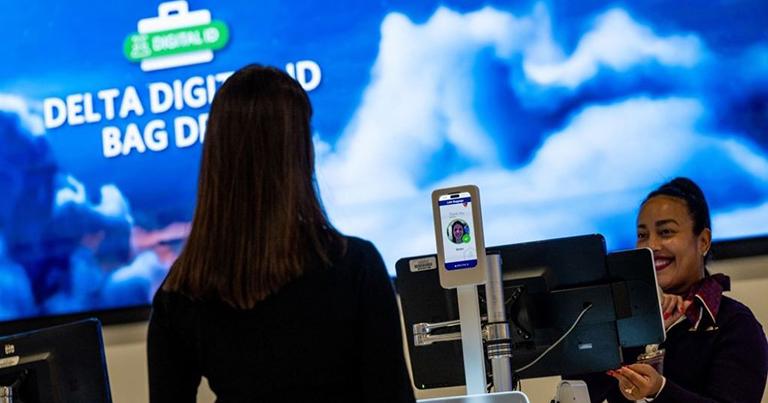
Biometrics has become a perennial fixture in our annual trends report. As this interview explains, it is the total enabler of a true seamless passenger experience, so there is clearly a business case for biometrics.
The post-pandemic preference for contactless technologies has only served to accelerate biometric adoption and its acceptance by travellers. IATA’s 2023 Global Passenger Survey indicates that: “Confidence in biometric identification is on the rise. In the last 12 months, 46% of passengers used biometrics at the airport, up from 34% in 2022. Furthermore, 75% of passengers prefer using biometric data over traditional passports and boarding passes.”
Implementation of biometric and digital identity technology continues at pace globally. ANA Aeroportos de Portugal and Vision-Box recently partnered to launch the “Biometric Experience by VINCI Airports” at Lisbon Airport, with plans to expand the project to four additional Portuguese airports. The many projects we have recently reported on include Fraport enabling all airlines at Frankfurt Airport to jointly use face biometrics as identification from check-in to boarding, becoming the first airport in Europe to offer biometric touchpoints to all airline passengers; Delta Air Lines expanding its Digital ID program to Los Angeles International Airport, LaGuardia Airport and JFK International Airport for a touchless airport experience; Airports Company South Africa deploying IDEMIA’s Passenger Flow Facilitation solution in nine South African airports for an end-to-end solution; Honolulu’s Daniel K. Inouye International Airport adopting SITA’s biometric-enabled SITA Smart Path to support U.S. Customs and Border Protection in fulfilling biometric passenger screening on exit from the U.S.; and Alaska Airlines partnering with CLEAR to provide a friction-free and predictable travel experience with CLEAR Plus.
The vast potential that new digital identity approaches leveraging biometrics can deliver to the sector was explored in detail in the Biometrics & Digital Identity Summit at FTE Global 2023, with insights from the likes of Miami International Airport, United Airlines, Fraport, and NEC. Watch the full video here. Biometrics and digital identity will undoubtedly remain a key area to watch in 2024.
Interested in the latest technologies and trends? Sign up to our newsletter >>Personalisation
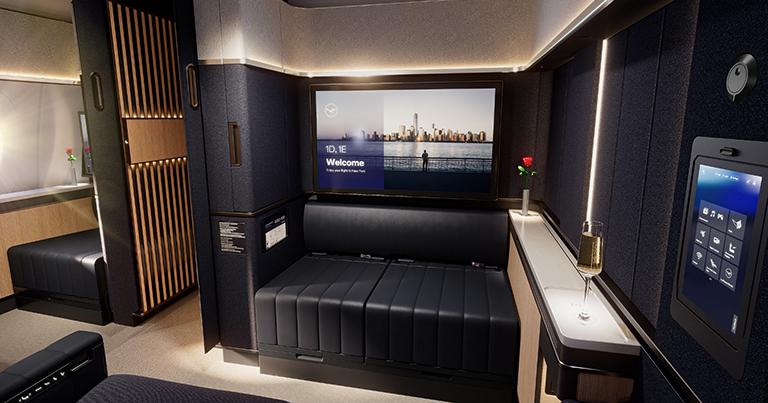
Travellers increasingly expect end-to-end personalisation at every step of their journey.
Lufthansa took personalisation to a new level last year with the launch of Allegris – its new long-haul travel experience. At its heart, it is about individualising travel and doing so in a way that is simple for customers. The individuality comes in passengers’ ability to create their own travel experience according to their personal needs, with choices in seats, meals and other elements of the journey. Indeed, the Lufthansa Allegris offer features seven kinds of seat. Allegris has been introduced on the Boeing 787-9, while the Airbus A350-900 will be the first to introduce the new First Class in early 2024. In this exclusive interview, Dr. Björn Becker, Head of Program Future Intercont Experience, Lufthansa Group, explained: “We believe that premium is about tailoring your product offer to the needs of your customers and delivering the opportunity to customise their trip based on their personal preferences.”
Los Angeles World Airports, meanwhile, has brought a new level of personalisation to digital retail and F&B ordering at LAX in partnership with Airport Dimensions, Servy, and Unibail-Rodamco-Westfield.
Cathay Pacific’s forthcoming new business class Aria Suite is all generating some buzz in terms of personalisation.
These are just a few examples in a trend we expect to grow exponentially in 2024 and beyond.
Interested in the latest technologies and trends? Sign up to our newsletter >>Urban Air Mobility
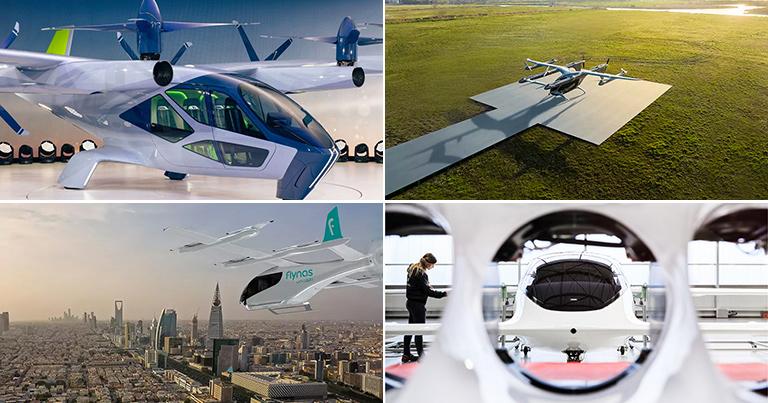
We feel Urban Air Mobility (UAM) is a trend set to accelerate rapidly in 2024. It was a hot topic at this week’s CES 2024 with Hyundai notably among those showcasing a new Supernal electric Vertical Take-Off and Landing (eVTOL) concept. Meanwhile, momentum is being driven by several airlines and airports around the world. The Lufthansa Group and Lilium have signed a Memorandum of Understanding to explore a strategic partnership on eVTOL aircraft operation in Europe; flynas and Eve Air Mobility are exploring the future of eVTOL aircraft operations in Saudi Arabia, aiming to launch in Riyadh and Jeddah in 2026; and Delta Air Lines and All Nippon Airways have both signed agreements with Joby Aviation, with plans to start commercial eVTOL flights in 2025.
Significant investments are being made by some of the biggest airports too. Groupe ADP plans to conduct experimental eVTOL flights from Pontoise Vertiport during the 2024 Paris Olympic and Paralympic Games. Dallas Fort Worth International Airport (DFW) and Overair, meanwhile, are exploring the future of vertiport development and eVTOL aircraft operations within the DFW Metroplex.
While there are developments globally, the U.S. will be the epicentre of where UAM really happens and we expect real progress to come out of the U.S. in the years to come.
The Future Mobility & Customer Journey conference at FTE Global 2023 offered extensive insights into the future mobility landscape, demonstrating the major growth opportunity that exists. Indeed, according to SITA’s recent ‘Meet the Megatrends’ report: “Airlines show increased interest in UAM, with 32% confirming major programs and R&D in UAM services and infrastructure. 33% of airlines invest in VTOL integration technologies for airline operations. UAM services and infrastructure are taking off for airports, with 32% confirming major programs and R&D on this front.”
Interested in the latest technologies and trends? Sign up to our newsletter >>Collaboration with startups
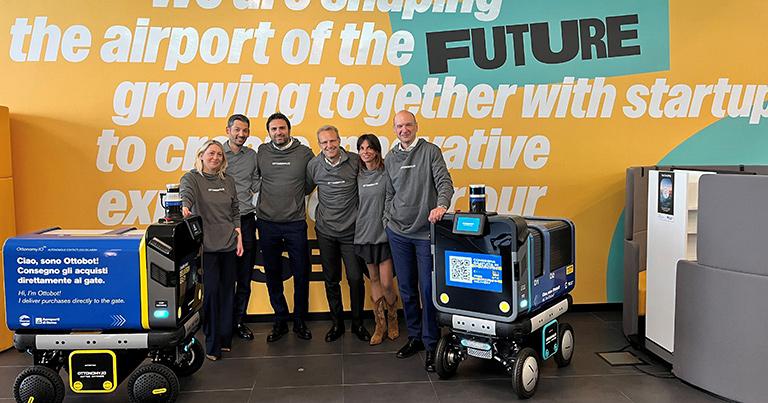
Last year, collaboration with startups was firmly back on the agenda after inevitably taking a back seat during the pandemic. It remains a challenging environment for some startups to raise funds and it is an important moment for the industry to support them.
Many progressive airlines and airports are increasingly collaborating with high potential startups and scaleups. Indeed, the exponential growth of the FTE Digital, Innovation & Startup Hub demonstrates this – International Airlines Group and Greater Orlando Aviation Authority are among the latest Corporate Partners to join, while we now have almost 450 approved startup members – and we expect the trend to further accelerate in 2024 and beyond.
Aeroporti di Roma will soon launch its third ‘Call for Ideas’ from startups as part of its “Runway to the Future” acceleration programme. This follows the launch last year of ADR Ventures – a new initiative to finance the development of projects in areas with high innovation potential, operating from the Innovation Hub at Rome Fiumicino Airport.
Pegasus Airlines also recently announced it is establishing a Technology Innovation Lab in Silicon Valley – a key part of which will be evaluating collaboration opportunities with startups.
Interested in the latest technologies and trends? Sign up to our newsletter >>Sustainability
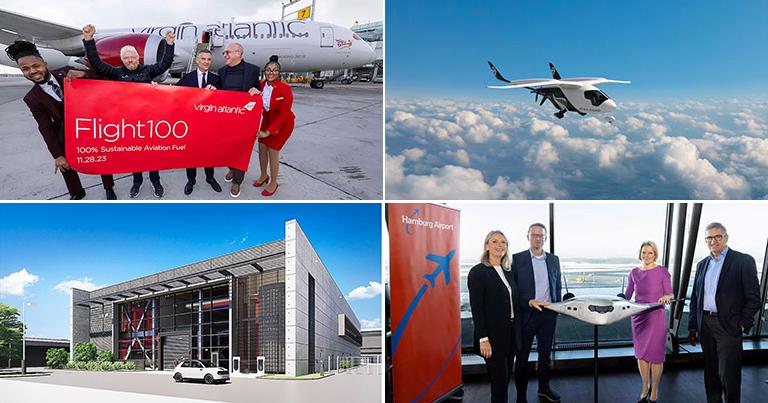
A common theme throughout the majority of innovation projects taking place across air transport is sustainability, which remains a key priority with the global industry’s commitment to reaching net zero carbon emissions by 2050.
Net zero will be reached through a combination of initiatives, including Sustainable Aviation Fuels, new aircraft technology, more efficient operations and infrastructure, and the development of new zero-emissions energy sources such as electric and hydrogen power.
Virgin Atlantic’s historic flight from London Heathrow to New York JFK last November using 100% Sustainable Aviation Fuel (SAF) marked the culmination of “a year of radical collaboration to demonstrate the capability of SAF”.
Air New Zealand took significant steps in its Mission Next Gen Aircraft programme last year, announcing in December that BETA’s ALIA will be the launch aircraft. The battery-powered all-electric aircraft is expected to join Air New Zealand’s fleet in 2026. “Decarbonising aviation isn’t easy, and we have a lot of work to do,” said Greg Foran, Chief Executive Officer, Air New Zealand. “We need to accelerate the pace of change in the technology, infrastructure, operations and regulation. While this aircraft will add to, not replace our existing fleet, it is a catalyst for that change.”
Significant developments also include Dallas Fort Worth International Airport’s new, electric Central Utility Plant (eCUP) that will provide sustainably powered heating and cooling capacity, and Pittsburgh International Airport’s first-of-its-kind microgrid powering the entire facility with natural gas and solar energy.
Another interesting initiative is the ‘Hydrogen Hub at Airports’ network. Hamburg Airport became the latest member in December 2023, joining Airbus and airports including Paris CDG and Singapore Changi. “Handling aircraft with hydrogen power will become as commonplace as refuelling them with kerosene is today,” said Nicole Dreyer-Langlet, responsible for research and technology within the Executive Board of Airbus Germany. “We are doing our bit to make this happen, but we depend on seamless cooperation with the airport specialists.”
Indeed, it is ultimately only through such collective, industry-wide efforts that net zero will be achieved.
Interested in the latest technologies and trends? Sign up to our newsletter >>Private Networks and Internet of Things

Private wireless remains one of the hottest opportunities for air transport stakeholders – a foundational core enabling technology that provides the connectivity needed for an “internet of everything” to support anything from autonomous vehicles on the ramp through to optimised operations at the gate for airlines, and that is just the beginning of the possibilities.
The technology was explored at FTE Global 2023 in the successful “Symposium on establishing and leveraging Private Networks at the airport”, featuring Metropolitan Airports Commission, Barich Inc, Dallas-Fort Worth International Airport (DFW), Boingo Wireless, and Citymesh.
Last year, DFW announced a partnership with AT&T to deploy a private 5G network to meet the rising demand for Internet of Things (IoT) uses cases and the digitisation of airport operations. Meanwhile, Port Authority of New York and New Jersey (PANYNJ), in collaboration with Boingo Wireless, last year deployed a private network at Newark Liberty International Airport’s new Terminal A. Robert Galvin, Chief Technology Officer, PANYNJ, explained that this “fulfils passenger demand for fast, seamless connectivity, while also providing a robust connectivity backbone to support digital airport operations. Newark Terminal A is utilising a combination of leading wireless technologies to create a tech-forward experience for travellers and airport employees.”
Brussels and Frankfurt airports are also among those to innovate with private 5G networks.
A technology trends report wouldn’t be complete without a mention of the Internet of Things (IoT). In fact, IoT is what can tie together a number of technologies and help to create a simpler and more seamless end-to-end travel experience. It looks more likely than ever that in the future all “things” will be connected – from airport assets to IFE systems and sensors integrated into seating – providing the industry with a constant stream of data which, if used correctly, could deliver new levels of operational efficiency and enable personalisation like never before.
Interested in the latest technologies and trends? Sign up to our newsletter >>Airlines’ journey to becoming fully-fledged digital retailers
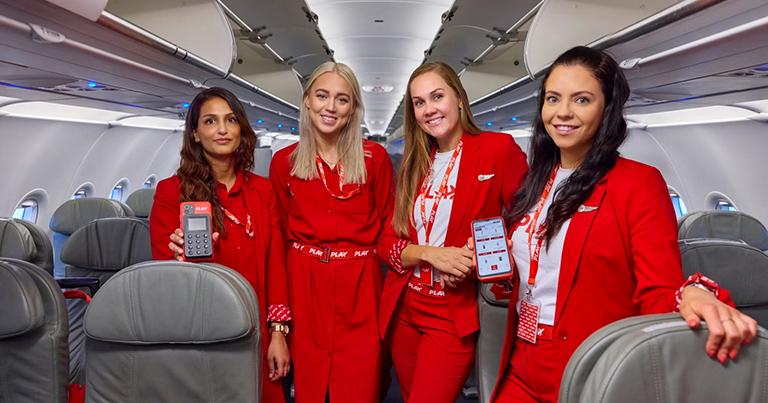
Progressive airlines are transitioning away from legacy approaches, navigating the tech landscape on their journey to becoming fully-fledged digital retailers. It is a trend we expect to accelerate in 2024. As Eric Leopold, Founder & Managing Director, Threedot and FTE Ancillary & Retailing Content Director, explains in this interview: “Most airlines just wait and see, focusing on applications rather than the underlying technologies. Leading airlines pay attention to new technologies and their impact on the business. For example, how to engage next-gen customers who interact in the metaverse, or how to make loyalty inter-operable using NFTs, or how to reduce payment costs using crypto rails.”
Icelandic low-cost airline PLAY is doing just that with progressive, customer-centric solutions designed to both enhance the passenger experience and increase ancillary revenue. This includes selecting MOST to provide it with onboard retailing and payment solutions. “We are exploring new technologies in combination with clever usage – AI-driven in the near future – of customer data to expand the product/service offering to our customers,” Georg Haraldsson, Chief Information Officer, PLAY, explains in this interview.
Startup low-cost airline Bonza launched operations last year and is similarly digitally-native, describing itself as “effectively a digital marketplace with wings”. “Our collective ambition from the get-go was to be an e-commerce company of choice – in a nutshell, an all-encompassing travel retail brand that happens to operate aircraft,” said Manish Raniga, CEO of Airline Investments, 777 Partners (owner of Bonza). “Our travel technology teams work in collaboration with Bonza to build the digital platform focused on connecting partners as a central design goal and travel retailing over time. We’re at the beginning of that journey, but naturally will retail the right products, at the right time, merchandised in a relevant way.”
Finnair and Amadeus are also collaborating with the aim of transforming airline retailing, bringing personalisation and real-time insights. “Better retailing capabilities including dynamic pricing, upselling, cross-selling, bundling and unbundling also support our target of boosting revenues and improving profitability,” said Antti Kleemola, Chief Information Officer, Finnair.
It is certainly a trend to watch and will be explored in more detail at this year’s FTE Ancillary & Retailing event, co-located with FTE EMEA in Dublin on 11-13 June 2024.

Metaverse, Augmented Reality and Extended Reality
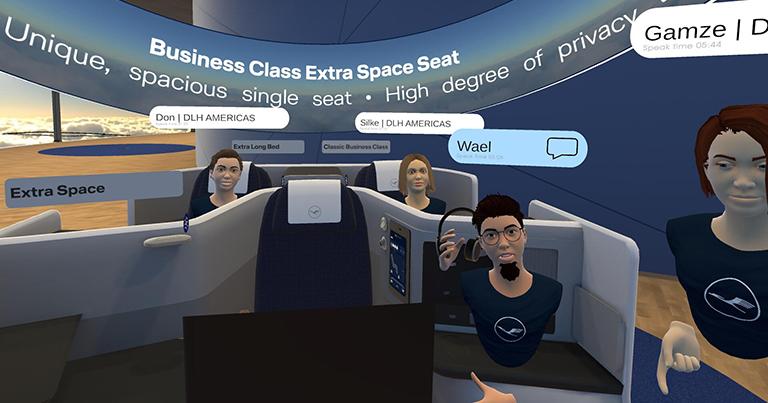
The metaverse – essentially an immersive virtual reality experience where people can interact with digital objects and digital representations of themselves and others – remained a hot topic at CES 2024. While realising the full potential of the metaverse is some way away, there are clearly opportunities to be utilised in the near-term and we feel it deserves a spot on our trends list.
Progressive airlines and airports are already exploring opportunities and use-cases. Lufthansa’s launch of its new Allegris long-haul travel experience last year was perhaps the most impressive use of the metaverse FTE has seen. The airline teamed-up with Meta Reality Labs to leverage the metaverse with Virtual Reality (VR) and Extended Reality (XR), blending the physical and digital by utilising Lufthansa’s new metaverse event location in the launch. Lufthansa plans to further develop its metaverse space into a virtual product world, where it can showcase its products, to both customers and colleagues, in an immersive way. “Mixed Reality is one of the coolest and most powerful tools I have seen for a long time,” said Dr. Björn Becker, Head of Program Future Intercont Experience, Lufthansa Group. “You can compare it with a hologram that appears in your space and that you can interact with – either single seats or even the whole cabin in full scale. It’s an immersive experience you can use for marketing purposes, but also training and even cabin development, replacing wooden mock-ups.”
Changi Airport Group (CAG) – a Headline Partner of FTE APEX Asia Expo – entered the metaverse last year following the unveiling of ChangiVerse, with the aim of revolutionising the online airport experience. “With our customers becoming more digitally savvy and interacting in the digital space, ChangiVerse is about engaging our customers and serving them better through innovation and experimentation, in line with our belief of customers being at the heart of everything we do,” said Ms Hung Jean, Group Senior Vice President of CAG’s Enterprise Digital Ecosystem & Business Division.
An exciting development in the XR space is Emirates’ collaboration with Amazon Web Services, developing an immersive Extended Reality (iXR) platform and capability for cabin crew, new joiners, and the wider industry partner community. Powered by spatial computing and Artificial Intelligence, it features 3D virtual hubs, virtual training, gamified environments and simulated experiences, creating a seamless and innovative onboarding experience.
Interested in the latest technologies and trends? Sign up to our newsletter >>Accessibility
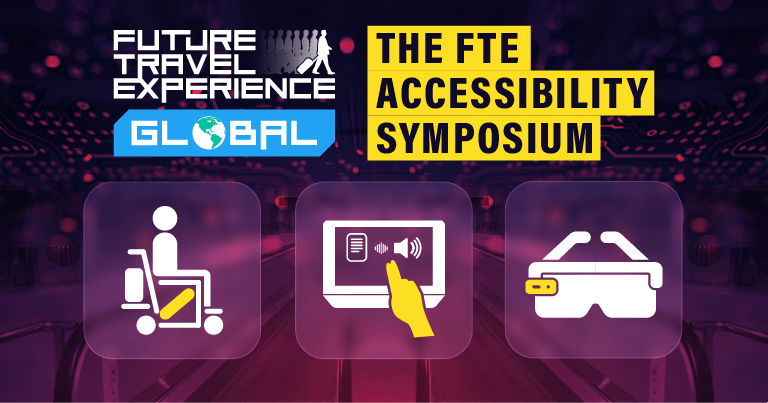
Accessibility and making travel more accessible for all remains an important trend and one that we will be exploring in-depth in the FTE Accessibility Symposium at FTE Global 2024.
Alaska Airlines makes considerable effort to ensure its kiosks, mobile app and website are accessible, while Seattle-Tacoma International Airport (SEA) has launched a new accessibility programme – SEA Access – and in its current upgrade programme is committed to “more accessible options from curb to gate”.
Vienna Airport and Austrian Airlines are also implementing measures to make their services more accessible for all travellers. Now, passengers who are blind or have low vision can be guided through the airport utilising the Aira App. Meanwhile, as part of the Hidden Disabilities Sunflower programme, passengers with invisible disabilities can call attention to their needs by wearing a lanyard, badge or bracelet in the Sunflower design.
A number of progressive airlines and airports are also exploring robotics in the accessibility space. One example is United’s collaboration with WHILL, with the aim of making airport terminal transport more accessible using autonomous personal mobility devices. International Airlines Group is also among those trialling autonomous personal mobility devices with its airport partners.
Interested in the latest technologies and trends? Sign up to our newsletter >>Related stories
- 10 technology trends that can enhance airline and airport operations in 2023
- 10 tech trends airports and airlines should watch out for in 2022
